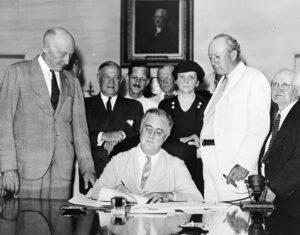by Charles Hoffacker
In several ways, Frances Perkins is a figure of influence. She has a place in several kinds of history: American history, women’s history, labor history, economic and political history, and other kinds of history as well. Perkins was a devout Christian who endeavored to live out her faith through public service. She was an Episcopalian throughout her adulthood and now her church honors her with a feast day on May 13. What place, then, does she have in church history?
Fredrica Harris Thompsett, for many years professor of Church History at the Episcopal Divinity School in Cambridge, Massachusetts provides an answer to this question. Thompsett’s book, Living with History appeared in 1999 as volume five of The New Church’s Teaching Series, a major resource for adult education in the Episcopal Church. Frances Perkins is highlighted in the finalchapter of Living with History, whichis entitled “New Occasions Teach New Duties.”
In that chapter, Thompsett identifies within the Anglican/Episcopal tradition a call for public responsibility.
“Are we willing to think of ourselves as people who intervene in history, who are shaping God’s reign on earth? Within Anglicanism the tradition of public responsibility, specifically of taking an active place amid the cloud of witnesses who shape church and society, is a significant theme.. . . The findings of Anglican theology and church history will not nourish couch-potatoes–quite the reverse.”
She then presents portraits of William Temple (1881-1944) and Frances Perkins(1880-1965). “Each entered the new century with a passionate commitment to tackle the industrial and economic evils of extreme poverty and harsh, unsafe labor conditions. . . . Each worked in the world to bring about the reign of God by contributing to a just society; each embodied the witness of the church at work in the world.” Like Perkins, Temple now appears on the Episcopal Church’s calendar of saints.
William Temple was a teenager when his father Frederick became Archbishop of Canterbury. Deeply rooted in the Church of England,William was ordained, taught at Oxford, served as headmaster of a private school, became rector of a fashionable London parish, and then a canon of Westminster Abbey before serving as Bishop of Manchester, Archbishop of York, and finally Archbishop of Canterbury. Throughout this stellar career, he came into contact with people living in diverse economic conditions. His appointment as Archbishop of York occurred in 1929, during a period of widespread economic depression. He was named Archbishop of Canterbury in 1942, as Britain struggled for survival against the Axis powers. The author of more than twenty-five books, Temple made major contributions to philosophical theology and the ecumenical movement. He promoted the cause of labor in various ways, especially through the Workers’ Educational Association.
Like earlier Anglican theologians, Temple recognized the suffering of impoverished populations as an indication of theological breakdown. Like these predecessors, he viewed care for society’s material needs as an essential component of the church’s witness. In one of his most popular and accessible books, Christianity and Social Order (1942), Temple asserted the church’s duty to interfere in social issues, citing the doctrine of the Incarnation of God in Christ as a mandate for such action. For him, Christianity must inculcate Christian principles in the economic order and advocate systemic change in the name of justice.
A contemporary of William Temple, Frances Perkins embodied the conscientious involvement in the affairs of the world that Temple advocated. A New England native and Mount Holyoke graduate, she was influenced by the social service and public policy practices of the settlement house movement. Her career in social reform and labor relations evolved into political activity in the New York state government. Frances Perkins served as the United States Secretary of Labor from 1933 to 1945, during the greatest era of economic dislocation and labor unrest in American history. She proved skillful in proposing and implementing New Deal legislation. Among her accomplishments were Social Security, wage and hour regulations, unemployment insurance, and the abolition of child labor. Perkins remains the gold standard for labor secretaries and arguably the most influential cabinet member in American history. She ended her career as a popular professor at Cornell University in the field of industrial and labor relations.
Like Temple, Perkins based her understanding of society upon belief in the Incarnation whereby the divine Word participates in the life, the suffering,and the struggles of humanity. “Perkins insisted that the church’s role is to inform the consciences of the people and to underscore the moral implications of their choices.”
As outstanding examples of the Anglican emphasis on social responsibility, Frances Perkins and William Temple affirmed the church’s involvement in public issues. The tradition that formed continues to have much to say about how communities, whether faith traditions or civil societies, can live together peacefully and productively and not be traumatized by the controversial issues that keep arising in history.
At the end of Living With History, Fredrica Thompsett presents seven simple guidelines for dealing with controversy that are consonant with Anglican/Episcopal tradition. She offers them to help Christian communities deal with change. But since they reflect the Anglican/ Episcopal sense of public responsibility, they can also help civil societies at every level fulfill their legitimate roles. Here are Thompsett’s guidelines, listed by title:
1. Seek common ground.
2. Value conversation.
3. Seek the broadest understanding.
4. Appreciate ambiguity.
5. Make room for imagination.
6. Ask questions.
7. Encourage one another.
Whatever faith commitments we have or do not have, today’s circumstances call us to principles such as these and to the responsibility for the common good that they embody.
Charles Hoffacker
The Rev. Charles Hoffacker is an Episcopal priest and a board member of the Frances Perkins Center.


